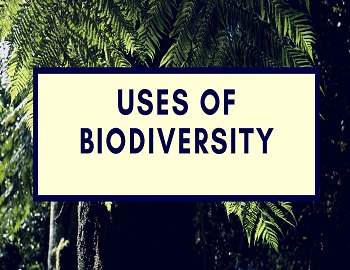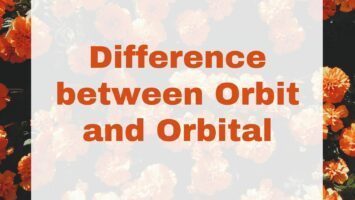Uses of Biodiversity:
The word biodiversity is derived from bios meaning life and diversity meaning variety. It refers to a wide variety of life on Earth- to all plants, animals and microorganisms which exist on this beautiful planet, to the various species and the ecosystem they live in. It is, thus the sum total of genes, species and ecosystems. In other words, it may be defined as the variety and variability among all groups of living organisms and the ecosystem complexes in which they occur.
Humans derive many direct and indirect benefits from biological diversity. All our food comes from wild species brought into domestication. Most of our medicines, pharmaceuticals, fibres, rubber and timber come from biological resources. The biodiversity also provides many ecological services free of charge that are responsible for maintaining ecosystems. Our water is supplied by one of nature’s most important processes, called the ‘hydrological cycle’. Forested watersheds provide clear, high-quality water for domestic or agricultural use, while healthy rivers provide water, transport and fish.
(1) Source of Food and Improved Varieties- Biodiversity has a prime role in agriculture as a source of new crops, material for breeding improved varieties and new biodegradable pesticides. Three carbohydrate-rich crops namely, wheat, corn and rice alone yield nearly two-third of the food production. Man is exploring not only new varieties of plants but also animal food to meet the demands of the increased human population. The commercial domestic species are crossbreed with their wild relatives to improve their traits. The genes of wild species are used to confer new properties such as diseases resistance or improve yield in domesticated species e.g., rice grown in Asia is protected from diseases by genes received from a single wild rice species (Oryza nivara) from India.
(2) Drugs and Medicines- A large number of substances with therapeutic properties are obtained from a variety of plant species. The wonder drug Penicillin used as an antibiotic is derived from a fungus called Penicillium. Likewise, we get Tetracyclin from a bacterium. Quinine, the cure for malaria is obtained from the bark of the Cinchona tree, while Digitalin is obtained from foxglove (Digitalis) which is an effective cure for heart ailments. Taxol from the bark of yew trees i.e. Taxus brevifolia, Taxus baccata for treating cancer, Vinblastin and Vincristine, have been obtained from the Periwinkle (Catharanthus) plant used for the treatment of leukaemia. A large number of marine animals are supposed to possess anti-cancer properties which are yet to be explored systematically.
(3) Fibres- A variety of plant species such as hemp, jute, cotton, flax, sunn hemp, agave, manila hemp etc. are the major sources of fibres. More and more varieties of plants are being explored for obtaining superior fibres.
(4) Aesthetic and Cultural Benefits- Biodiversity has great aesthetic value. Examples of aesthetic rewards include ecotourism, bird watching, wildlife, pet-keeping and gardening etc. In the majority of Indian villages and towns, plants like Ocimum sanctum (Tulsi) and Ficus religiosa (Peepal) are considered sacred and worshipped by the people. Several birds and even snakes have been considered sacred.
(5) Ethical Value- It is also sometimes known as existence value. It involves ethical issues like “all life must be preserved”. It is based on the concept of “Live and Let Live”. If we want our human race to survive, then we must protect all biodiversity, because biodiversity is valuable.
(6) Ecosystem Services- Biological diversity is also essential for preserving ecological processes, such as fixing and recycling of nutrients, soil formation, circulation and cleansing of air and water, global life support (plants absorb CO2, give out O2), maintaining the water balance within ecosystems, watershed protection, maintaining stream and river flows throughout the year, erosion control and local flood reduction.









Comments (No)